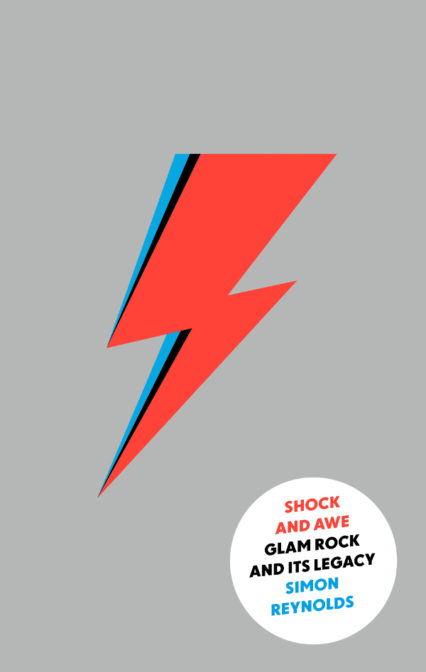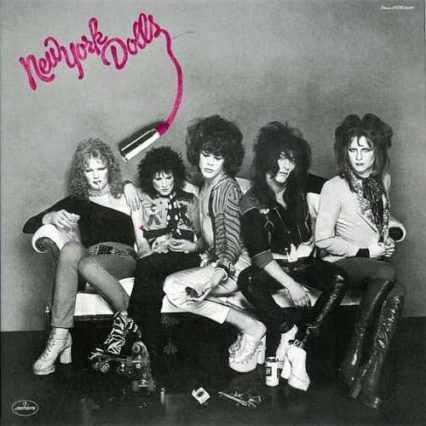In advance of the publication of Shock and Awe, his definitive take on glam rock and its cultural legacy, Simon Reynolds speaks with Craig Austin about this most decadent and provocative of musical genres. One of the most acclaimed and respected music writers of his generation, Reynolds charts the retro future sounds, outrageous styles and gender-fluid sexual politics that came to define the first half of the seventies. In doing so, he brings to life the genre’s artistic legacy and on-going influence upon today’s music scene, and addresses the cultural aftershocks of the deaths of both David Bowie and Prince.
One of the more progressive, and ultimately comforting, developments in the days and weeks that followed David Bowie’s untimely passing was the nation’s willingness to revisit the more flamboyant and outré passages of its pop cultural playbook; an opportunity for Britain to celebrate and revel in the flamboyance, innovation and devilment that both inspired and defined the haircuts, trousers and lifestyle choices of the millions who fell under its beguilingly wayward spell.
 Yet throughout the decades that saw a red flash incrementally mutate into a black star via all of its incarnations in-between, there has perhaps never been a pop cultural currency that has surged and plummeted with such volatility as the grandiose artifice of glam. Speaking to me from his home in Los Angeles, itself the one-time epicentre of glam’s stateside glimmer twin ‘glitter’, the writer Simon Reynolds discusses the forthcoming publication of Shock and Awe, his unquestionably definitive take upon glam and its sprawling cultural legacy. But even he is under no illusion about how swiftly the phenomenon initially tumbled from public favour. ‘Bowie and Roxy Music were always highly regarded’ he reflects, ‘but I don’t think that much of the other stuff was held in the same regard. By the 1980s Cockney Rebel were long forgotten, how huge they were remains long forgotten, and much of the other stuff would have been considered a little silly. It wasn’t maybe helped by the fact that before the Gary Glitter scandal he spent most of the 80s trudging around the country playing every college party he could in order to pay off his tax bill. Slade had disappeared and the rest were on the greatest hits treadmill, but by the end of the 90s things began to change’.
Yet throughout the decades that saw a red flash incrementally mutate into a black star via all of its incarnations in-between, there has perhaps never been a pop cultural currency that has surged and plummeted with such volatility as the grandiose artifice of glam. Speaking to me from his home in Los Angeles, itself the one-time epicentre of glam’s stateside glimmer twin ‘glitter’, the writer Simon Reynolds discusses the forthcoming publication of Shock and Awe, his unquestionably definitive take upon glam and its sprawling cultural legacy. But even he is under no illusion about how swiftly the phenomenon initially tumbled from public favour. ‘Bowie and Roxy Music were always highly regarded’ he reflects, ‘but I don’t think that much of the other stuff was held in the same regard. By the 1980s Cockney Rebel were long forgotten, how huge they were remains long forgotten, and much of the other stuff would have been considered a little silly. It wasn’t maybe helped by the fact that before the Gary Glitter scandal he spent most of the 80s trudging around the country playing every college party he could in order to pay off his tax bill. Slade had disappeared and the rest were on the greatest hits treadmill, but by the end of the 90s things began to change’.
Assisted by Todd Haynes’ cinematic glam vehicle Velvet Goldmine, a film that built upon the glam/trash consciousness that had already been raised by the likes of Pulp and Suede, a tentative cultural re-evaluation was afoot. ‘By that point’ Reynolds recalls, ‘there was an emerging feeling that it had been something of a unique era. There’s that 20-year rule about revivalism, the idea that by that point there’s enough distance to find something charming and interesting about a scene or a movement. The people who lived through it get nostalgic about it and the people who didn’t get intrigued by it. But even then it was still very much centred on Bowie and Roxy and there was still quite a bit of snootiness about the other music and bands’.
When writing 2010’s critically acclaimed Retromania, a book that addressed pop culture’s contemporary addiction to its own past, the author became preoccupied with the notion that pop music invented post-modernism by itself without any assistance from other art forms, an idea that kick-started Shock and Awe’s gestation period: ‘Glam was like a commentary about rock as well as being rock. It addressed the mythology of rock, the idea of stardom, and could be unapologetically nostalgic. It seemed to yearn for lost innocence while being very sophisticated and camp at the same time’
Within the pages of Shock and Awe Reynolds is as keen to elevate the scene’s fascinating undercard as he is its sequinned heavyweights. Yet despite the author’s best efforts he nevertheless felt the need to succumb to the unavoidably towering influence of David Bowie, the icon who ultimately bookends the story. ‘That wasn’t exactly my intention’ Reynolds reflects, ‘but then he unexpectedly died and it felt impossible to do otherwise. My initial desire was to go against the fixation upon one or two figures from that era but the trouble is that he did so many interesting things that I ended up having four chapters about him. And even when I did the sweep through of the subsequent decades, the aftershocks of glam, he still kept coming up as a recurrent theme, He is the most compelling figure because he changes so often. It often feels like pop music is a machine for creating misery, because most people never make it and the people that do make it have this problem with sustaining it. And Bowie set it up even worse, because he didn’t just have to sustain it, he had to constantly keep changing. He rewrote the rules of what it meant to be a rock star. It was no longer enough just to have a thing that you do well, and then you repeat it, much like Jagger has done. Bowie was the opposite of that, but it must be an incredible burden to place upon yourself; really wearing and daunting, especially in the later decades when those changes were misfiring more frequently. The end was unquestionably triumphant though. I don’t think there’s any equivalent story in any field of art of a star making their exit in such an amazingly executed way. Ultimately, he just had great ideas, made great records, and made great statements’

Despite the contemporary rush to deify Bowie, Reynolds does not shy away from unearthing the more troubling statements from a period in which the drug-addled Thin White Duke’s obsession with artifice and role-play threatened to tip into something more sinister. In a 1975 interview with Cameron Crowe for Rolling Stone the Beckenham Messiah seemingly tumbles into the thicket of deranged fantasy: ‘I might have been a bloody good Hitler… an excellent dictator. Very eccentric and quite mad… I wouldn’t mind being the first English President of the United States either. I’m certainly right-wing enough… I’ll bloody lead this country, make it a great fucking nation!’ Refreshingly, the author does not seek to adopt a revisionist take on such proclamations, this being just one example of Bowie’s numerous and reckless flirtations with fascism: ‘There are a lot of them, and it’s not as if there are many other examples of political statements in Bowie’s career. If you were to do an inventory of Bowie’s political statements the preponderance of them would be his ones for the need for a strong leader, the first example of this being as early as 1969. There’s an underlying superiority complex there that could lend itself to fascism, this Nietzschean idea that the bulk of the population are malleable and weak and need to be led by some kind of elite. I still find it quite troubling but it almost felt as if it was some kind of aesthetic trip he was on’
The theme of elitism is something that is also a constant refrain within the story of Roxy Music, one most evidently embodied by its urbane Geordie lynchpin Bryan Ferry, a man forever enthralled by self-improvement, a fantasy of aristocracy, and a ‘penchant for the posh’. ‘Billy Fisher and Bryan Ferry share more than just initials’ the author skewers astutely. There’s an especially uncomfortable section in the book in which the newly prosperous son of the industrial north, his head turned by the bright light and black hearts of Knightsbridge, speaks about his working class parents in a manner that borders on the derogatory. It has Dickensian echoes of the newly genteel Pip’s embarrassment upon reacquainting himself with the awkward and embarrassed Joe Gargery, a nagging remnant of a life seemingly abandoned.
‘I love glam and I love the music’ Reynolds reflects ‘but I’m of the left politically and it’s an aspect of glam that I find uncomfortable. There’s quite a big snob factor and it’s one that Bryan Ferry cultivated quite deliberately. The last song on the first Roxy Music album ends with the words ‘should make the cognoscenti think’, a deliberate attempt to define Roxy fans as the crème de la crème, a phrase that Ferry actually used. You can argue that it was mainly arty working class kids trying to create their own aristocracy, an adolescent desire to separate yourself from your parents, but when class is involved as well it does get to become a bit painful. It’s why I used the comparison of Billy Fisher in Billy Liar, the idea that both felt that they were suffering amongst this mediocrity and smallness and that both retreated into fantasising about a more elegant, sophisticated and intellectual way of life. With Billy Fisher it remains a fantasy, but Ferry actualises it, deliberately surrounding himself with models and artists. But then he starts hanging out with the actual aristocracy and his sons end up becoming rabid foxhunters. It’s the tension that I will always have with glam’.

The scope and breadth of Shock and Awe will enthral and delight those already entranced by the genre, a church so broad that it can harbour both the bovver-rock terrace chants of Slade and the unapologetically effeminate melodrama of Jobriath. It is a story about one of the most captivating periods in musical history, and yet at the same time a fascinating social insight into the seismic socio-political changes that were happening on both sides of the Atlantic in the 1970s. Reynolds sheds a fascinating light upon the sexual politics of the period and the fluidity of sexual identity via the ciphers of Bolan and Bowie but always with a wry smile and a knowing sense of the absurd: ‘There are traits of it within America, the New York Dolls and the whole hair metal scenes being great examples, but I think it is a very British thing. On the one hand you have the British tradition of aesthetes and androgynous figures going back to dandyism, Oscar Wilde, and the Bright Young Things of the 1920s but the other reality is rooted in the tradition of panto, the idea that it doesn’t really take much encouragement to get British men to put on women’s clothing. Part of my research unearthed so many photos of Keith Moon dressed up in women’s clothing, it was something he clearly enjoyed. I don’t think he thought he looked particularly beautiful, I think he just enjoyed the sheer spectacle of it all’
Sylvain Sylvain of the inimitable New York Dolls perhaps best summed up the visceral thrill of glam when he proclaimed that ‘we were living this movie, everybody wants to see it, and we were giving it to them’. Similarly, Reynolds, when critiquing the cultural impact of Lady Gaga – perhaps glam’s most immediately identifiable grandchild – celebrates the fact that ‘this fierce and fabulous flame of self-belief is a magical defence against those who’d crush your ego, and perhaps your body’. ‘Gaga speaks for the misfits, the gender-confused, the bullied’ he continues with conviction, and while it may not have been the legacy that either Bryan Ferry or Noddy Holder intended, it speaks volumes about the singular emancipatory power of unconventional pop music to both empower and endure.
Shock and Awe is published by Faber & Faber on October 6
From the Archive: You can read Craig Austin’s own take on the glam phenomenon here











